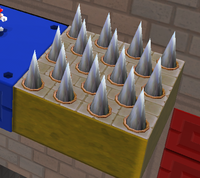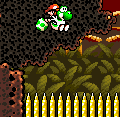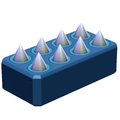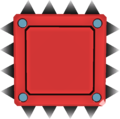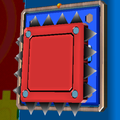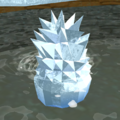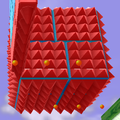Spike Trap: Difference between revisions
Nintendo101 (talk | contribs) (→Gallery: Captain Toad) |
Nintendo101 (talk | contribs) (→Screenshots: bergy bit) |
||
| Line 137: | Line 137: | ||
Ladida Plains 1-3.png|''[[Super Princess Peach]]'' | Ladida Plains 1-3.png|''[[Super Princess Peach]]'' | ||
SMG Spike Trap.png|''Super Mario Galaxy'' | SMG Spike Trap.png|''Super Mario Galaxy'' | ||
SMG Screenshot Spiky Ice Obstacle.png|''Super Mario Galaxy'' | |||
Flipsville spikes.png|''[[Super Mario Galaxy 2]]'' | Flipsville spikes.png|''[[Super Mario Galaxy 2]]'' | ||
FireFleeingMario.png|''[[New Super Mario Bros. U]]'' | FireFleeingMario.png|''[[New Super Mario Bros. U]]'' | ||
Revision as of 22:37, October 17, 2024
- This article is about the common obstacle. For other uses of the word "spike", see Spike (disambiguation).
| Spike Trap | |||
|---|---|---|---|
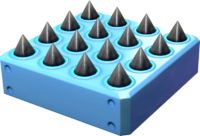 Model from Super Mario Odyssey | |||
| First appearance | Yume Kōjō: Doki Doki Panic (1987, overall) Super Mario Bros. 2 (1988, Super Mario franchise) | ||
| Latest appearance | Mario vs. Donkey Kong (Nintendo Switch) (2024) | ||
| |||
| |||
Spike Traps (or spikes, sometimes Spiked Blocks,[1] spiked platforms,[2] spike platforms,[3] or Spiked Floors[4]) are harmful obstacles appearing in many games of the Super Mario franchise. Spike Traps can be stationary, retractable, or attached to a moving object. They are introduced in Super Mario Bros. 2. They function similarly to the Icicles from Mario Bros.; however, Spike Traps fall differently.
History
Super Mario series
Spike Traps are very common obstacles throughout the Super Mario series. When touched, they cause the player to lose their current power-up and if the player is Small Mario, they will lose a life. Players can safely traverse across spikes when invincible without any consequences.
Super Mario Bros. 2
Spike Traps appear in a few levels in Super Mario Bros. 2. They are crossed only by riding on an Autobomb.
Super Mario Bros. 3
Spikes return in Super Mario Bros. 3. They can face in any of the cardinal directions. Spikes can be crossed harmlessly by wearing a Goomba's Shoe, but the player character still takes damage if touching one from the side or on the head. The World-e level Castle Dash of Super Mario Advance 4: Super Mario Bros. 3 has large circular spike objects that float in place, also appearing with moving ones in the Orange Mushroom House.
Super Mario World
Spike Traps in Super Mario World can be crossed by Yoshi harmlessly. Spike Traps are on some moving stone blocks. This game also introduces the falling spike.
Super Mario Bros. Deluxe
Spike Traps return in the You vs. Boo mode of Super Mario Bros. Deluxe. They appear in some levels and are changed to solid blocks with Face Blocks.
Super Mario Sunshine
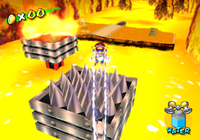
Spike Traps return in Super Mario Sunshine. They are encountered in Corona Mountain. Spike Traps are likely to cause Mario to lose a life if touched because Mario's invincibility frames do not react to them.
New Super Mario Bros.
Spike Traps appear in castle and tower levels in New Super Mario Bros. Some have Spike Traps on them, like in Super Mario World.
Super Mario Galaxy
Spikes in Super Mario Galaxy appear in three different varieties: moving lifts with spikes embedded into their sides appear in the Good Egg Galaxy missions Dino Piranha and Dino Piranha Speed Run, the Flipswitch Galaxy mission Painting the Planet Yellow, and the Toy Time Galaxy missions The Flipswitch Chain and Fast Foes of Toy Time; bergy bits covered in spikes out of ice appear in the Beach Bowl Galaxy mission Wall Jumping up Waterfalls; and spikes attached to terrain appear in the Gold Leaf Galaxy mission When It Rains, It Pours. Mario or Luigi bounces into the air, loses health, and runs uncontrollably after coming into contact with spikes attached to terrain, similarly to lava.
New Super Mario Bros. Wii
Spike Traps return in New Super Mario Bros. Wii. They appear in two forms: traps with each spike at one block wide like in Super Mario World, as seen in World 5-![]() Tower, and traps with each spike half the length of a block like in Super Mario Bros. 3, as seen in World 3-
Tower, and traps with each spike half the length of a block like in Super Mario Bros. 3, as seen in World 3-![]() Castle.
Castle.
Super Mario Galaxy 2
Spikes return in Super Mario Galaxy 2. They are the same as in Super Mario Galaxy. They are encountered in the Clockwork Ruins Galaxy mission Time for Adventure and the Flip-Out Galaxy missions Wicked Wall Jumps and Cosmic Clone Wall Jumpers.
Super Mario 3D Land
Spike Bars debut in Super Mario 3D Land, operating similarly to Fire Bars. Retractable spikes on the floor appear too.
Super Mario 3D World / Super Mario 3D World + Bowser's Fury
Ground spike traps appear in Super Mario 3D World and Super Mario 3D World + Bowser's Fury. They are encountered in levels such as Hands-On Hall and Spiky Spike Bridge.
Super Mario Maker / Super Mario Maker for Nintendo 3DS / Super Mario Maker 2
Spike Traps are course elements in Super Mario Maker, its port, and Super Mario Maker 2. They are classified as block objects. Spike Traps can change appearance depending on the game style and theme; in underwater areas in the Super Mario Bros. 3 and Super Mario World game styles, they become a Jelectro or a Sea Urchin from The Legend of Zelda: Link's Awakening, respectively. Shaking a Spike Trap in the New Super Mario Bros. U ground theme plays a train sound.[5] Spike Traps in Super Mario Maker 2 have a slightly wider hitbox and are replaced with Spike Blocks in the Super Mario 3D World style.
Super Mario Run
Spike Traps return in Super Mario Run. They look identically to the Spike Traps in the New Super Mario Bros. U style of Super Mario Maker. Spike Traps are first encountered in Shell Me the Way! when collecting the Black Coins.
Super Mario Odyssey
Spike Traps appear in Super Mario Odyssey with their design from Super Mario 3D World design. They are encountered in Bowser's Kingdom. They can be crossed safely by capturing Jizo statues.
Super Mario Bros. Wonder
Spike Traps are obstacles in Super Mario Bros. Wonder. They are depicted with a few different designs. One of the designs resembles a spiked ball. The upward pointed types have two aesthetic varieties, resembling either a rock or being colored orange.
Yoshi's Island series
Spikes in the Yoshi's Island series instantly causes a Yoshi to lose a life, unlike with other games. The games also feature thorns, which function identically to spikes. If Yoshi touches spikes, he is shown spinning and then collapsing; not counting when Baby Mario is snatched away from Yoshi, this is only one of two ways where Yoshi's death is shown onscreen, the other being from touching lava.
Yoshi's Story
Yoshi's Story features living, jumping Spikes in Bone Dragon Pit and Magma Castle.
Mario vs. Donkey Kong series
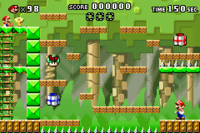
Spikes are obstacles throughout the Mario vs. Donkey Kong series. They can defeat the playable characters instantly but not enemies, which walk across them without taking damage. Spikes bob up and down slightly. They have a variety of appearances throughout the series. They are depicted generically in Mario vs. Donkey Kong and point upward only. Spikes have a red metallic base framing them in Mario vs. Donkey Kong 2: March of the Minis. Spikes from Mario vs. Donkey Kong: Mini-Land Mayhem! onward also cover walls and ceilings. Each row of spikes in Mario vs. Donkey Kong: Tipping Stars and Mini Mario & Friends: amiibo Challenge has two additional smaller spikes on its sides, and the middle spikes appear shorter than in previous entries of the Mario vs. Donkey Kong series.
The spikes in Mario vs. Donkey Kong cover pits and platforms, and can be crossed by riding Shy Guys and RamRams across a bed of spikes. Spikes in Mario vs. Donkey Kong 2: March of the Minis and Mario vs. Donkey Kong: Minis March Again! are harmless on the sides, although Minis try to jump over them and break themselves regardless. Mario and Donkey Kong: Minis on the Move has some tiles consisting of spike pits, and any Mini that reaches the edge of one tips for a short time, eventually falling into them and causing a Game Over if the path is not modified quickly enough. The spikes in Mario vs. Donkey Kong: Tipping Stars and Mini Mario & Friends: amiibo Challenge have two additional smaller spikes on its sides that destroy a Mini instantly upon contact, though the Spike Guard ability of Mini Bowser Jr. allows it to hover across safely.
Paper Mario series
 This section is a stub. You can help the Super Mario Wiki by expanding it.
This section is a stub. You can help the Super Mario Wiki by expanding it.
Paper Mario: The Thousand-Year Door
A Spike Trap appears in Paper Mario: The Thousand-Year Door in Hooktail Castle. When Mario takes the Black Key out of the chest, spikes pop out of the ground to form a maze and the ceiling starts to lower down with spikes. Mario must run out of the spike maze in 50 seconds or he will receive a Game Over.
Spikes also serve as obstacles in some platforming sections, and falling into them will cause Mario to lose 1 HP, go flying off the top of the screen, and land at the start of the section.
Paper Mario: Color Splash
Spike Traps appear in Paper Mario: Color Splash. Spike pits appear in levels such as Mustard Café, The Golden Coliseum, and Fortune Island. 8-bit spikes appear in Green Energy Plant. In Kiwano Temple, there are many spikes that resemble Spiny Shells. Some must be crossed by rolling platforms, and others must be flipped over with a POW Block.
Super Princess Peach
Spikes are obstacles appearing in two varieties in Super Princess Peach. One type is a round, block-sized object often found in midair or on ceilings, usually on top of areas with blue Donut Blocks passable only with the Gloom vibe, and they have an animation for rotating. The other type is on the ground, having thematic differences between each world, and touching one costs Princess Peach half a heart of damage.
Nintendo Land
- “You can use levers to deal with annoying spikes. Hit a lever to trigger or withdraw spikes.”
- —Monita, Nintendo Land
Spikes are hazards in the Yoshi's Fruit Cart minigame in Nintendo Land. They are first encountered in Gate 23. Spikes can be retracted by using a lever, allowing the Yoshi Cart to move on them safely, but otherwise costs the player a life when touched.
Luigi's Mansion 3
Spike Traps are hazards in Luigi's Mansion 3. They are found mainly in Castle MacFrights. Gooigi can move through Spike Traps without taking damage, unlike Luigi.
The Super Mario Bros. Movie
Many Spike Traps are seen in The Super Mario Bros. Movie scattered around the Training Course and attached to Brick Blocks and Empty Blocks.
Profiles
Super Mario Bros. Deluxe
- Instruction booklet: You'll take damage if you touch a block with spikes protruding in all four directions.[1]
Nintendo Land
- Monita's prize description: This trap can be levered in and out of the ground. The cart may not be able to feel pain, but stepping on one of these will certainly damage it.
Gallery
Artwork
Sprites and models
Super Mario Land (poison needles)
Super Mario Maker (Super Mario Bros. style)
Super Mario Maker (Super Mario Bros. 3 style)
Super Mario Maker (New Super Mario Bros. U style)
Screenshots
Names in other languages
| Language | Name | Meaning | Notes |
|---|---|---|---|
| Japanese | トゲ[6] Toge |
Spike | |
| トゲブロック[7] Toge Burokku |
Spike Block | ||
| トゲ床[8] Toge Yuka |
Spike Floor | ||
| 針[9][page number needed] Hari |
Needle | ||
| 針の床[9] Hari no Yuka |
Needled Floor | ||
| トゲ地形 (Super Mario Maker 2)[?] Toge Chikei |
Spike Terrain | ||
| Chinese | 尖刺地形[?] Jiāncì Dìxíng |
Sharp point terrain | |
| Dutch | Stekels[?] | Prickles | |
| French | Boule à pointes[?] | Spiked ball | |
| German | Stacheln[?] | Spikes | |
| Italian | Spuntoni[?] | Spikes | |
| Fiori dalle spine avvelenate[10] | Flowers with poisoned spikes/thorns | ||
| Pavimento con punte[11] | Floor with spikes | ||
| Korean | 가시지형[?] Gasi Jihyeong |
Spike Terrain | |
| Portuguese | Armadilha Espinhosa[?] | Spiked Trap | |
| Russian | Колючка-западня[?] Kolyuchka-zapadnya |
Trap Spike | |
| Spanish | Trampa Espinosa[?] | Spiky Trap | |
| Bola de picos[?] |
References
- ^ a b 1999. Super Mario Bros. Deluxe instruction booklet. Redmond, WA: Nintendo of America (American English). Page 19.
- ^ Hodgson, David S J; Stratton, Bryan; Stratton, Stephen (September 3, 2002). Super Mario Sunshine Prima's Official Strategy Guide. Prima Games (American English). ISBN 0-7615-3961-1. Page 15, 170 and 171.
- ^ Hodgson, David S J; Stratton, Bryan; Stratton, Stephen (September 3, 2002). Super Mario Sunshine Prima's Official Strategy Guide. Prima Games (American English). ISBN 0-7615-3961-1. Page 171.
- ^ von Esmarch, Nick; van Grier, Cory (February 21, 2014). Donkey Kong Country: Tropical Freeze PRIMA Official Game Guide. Prima Games (American English). ISBN 978-0804162524. Page 26.
- ^ GameXplain (April 4, 2016). Train Whistle SECRET in Super Mario Maker. YouTube (English). Retrieved May 18, 2016.
- ^ Sakai, Kazuya (Ambit), et al. (October 19, 2015). 『スーパーマリオブラザーズ百科: 任天堂公式ガイドブック』 (Super Mario Bros. Hyakka: Nintendo Kōshiki Guidebook). Tokyo: Shogakukan (Japanese). ISBN 978-4-09-106569-8. Page 41, 61, 78, 105, 119, 150, 200.
- ^ 1993. Mario & Wario instruction booklet. Nintendo (Japanese). Page 9.
- ^ 2015. Super Mario Bros. Hyakka: Nintendo Kōshiki Guidebook. Shogakukan (Japanese). Page 170, 186, 233.
- ^ a b Mario vs. Donkey Kong Shogakukan book
- ^ Super Mario Land Italian manual. Page 12.
- ^ Super Mario Land (3DS - Virtual Console) Italian e-manual. Page 13.
- Hazardous objects
- DK: King of Swing
- DK: Jungle Climber
- Mario & Wario
- Mario and Donkey Kong: Minis on the Move
- Mario vs. Donkey Kong objects
- Mario vs. Donkey Kong: Mini-Land Mayhem!
- Mario vs. Donkey Kong: Minis March Again!
- Mario vs. Donkey Kong: Tipping Stars
- Mario vs. Donkey Kong 2: March of the Minis
- Mini Mario & Friends: amiibo Challenge objects
- New Super Mario Bros. objects
- New Super Mario Bros. 2 objects
- New Super Mario Bros. U objects
- New Super Mario Bros. Wii objects
- Nintendo Land objects
- Paper Mario: Sticker Star objects
- Paper Mario: Color Splash objects
- Super Mario Advance objects
- Super Mario Advance 4: Super Mario Bros. 3 objects
- Super Mario Bros. 2 objects
- Super Mario Bros. 3 objects
- Super Mario Bros. Wonder objects
- Super Mario Galaxy 2 objects
- Super Mario Maker objects
- Super Mario Maker 2 objects
- Super Mario Sunshine objects
- Super Mario Odyssey objects
- Super Mario World objects
- Super Mario World 2: Yoshi's Island objects
- Super Paper Mario objects
- Super Princess Peach objects
- The Super Mario Bros. Movie objects
- Wario Land: Super Mario Land 3 objects
- Wario Land II objects
- Yoshi Topsy-Turvy objects
- Yoshi's Island DS objects
- Yoshi's Island: Super Mario Advance 3
- Yoshi's New Island objects
- Yoshi's Story objects
- Yoshi's Woolly World objects
